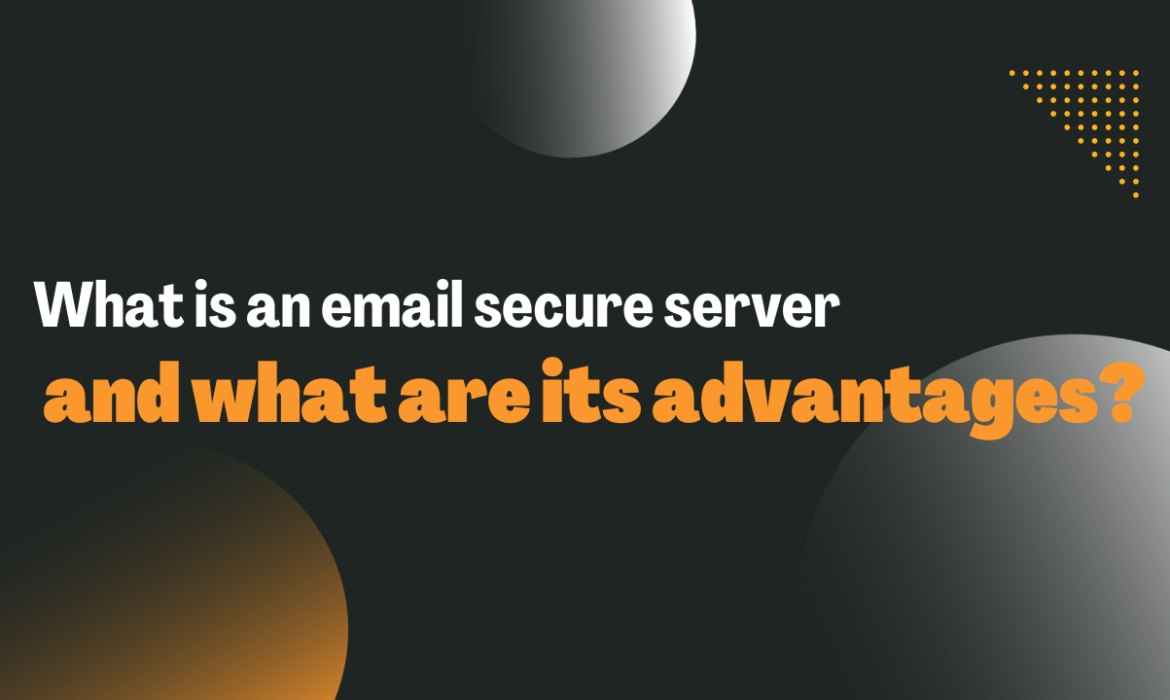What is an email secure server and what are its advantages?
In an era where digital communication reigns supreme, the security of sensitive information is of paramount importance. Businesses and individuals alike heavily rely on email for communication, making it crucial to ensure that this mode of correspondence is safeguarded against potential threats. Enter the realm of email secure servers – the unsung heroes of the digital landscape. In this comprehensive exploration, we will unravel the intricacies of what an email secure server is and delve into the myriad advantages it brings to the table.
Understanding Email Secure Servers: A Primer
Before we dive into the advantages, let’s establish a foundational understanding of what an email secure server entails.
What is an Email Secure Server?
An email secure server is a specialized mail server equipped with advanced email security features designed to fortify the confidentiality, integrity, and availability of email communications. Unlike traditional email servers, these secure counterparts prioritize the protection of sensitive data against cyber threats, ensuring that messages and attachments are shielded from unauthorized access and malicious activities.
Key Components of an Email Secure Server:
Encryption Protocols:
One of the core features of an email secure server is its use of encryption protocols, such as Transport Layer Security (TLS). This ensures that the transmission of emails between servers remains secure, mitigating the risk of eavesdropping and interception.
Authentication Mechanisms:
Secure servers implement robust authentication mechanisms to verify the identity of users and systems. This helps prevent email spoofing and unauthorized access to the server, ensuring that only legitimate entities can send or receive emails.
Spam and Malware Filtering:
Advanced spam and malware filters are integrated into secure servers to identify and block malicious content. This serves as a proactive defense against phishing attacks, viruses, and other forms of malware that may compromise the integrity of email communications.
Access Controls:
Access control features are implemented to regulate and manage user permissions. This ensures that only authorized individuals have access to sensitive information and configuration settings, reducing the risk of unauthorized data access.
Data Loss Prevention (DLP):
Email secure servers often incorporate Data Loss Prevention mechanisms to monitor and control the flow of sensitive information within emails. This helps prevent accidental or intentional data leakage, a critical concern in today’s data-driven landscape.
Audit Trails and Logging:
Comprehensive logging and audit trail functionalities are essential components of email secure servers. These features enable administrators to monitor and track email activities, facilitating the identification and investigation of security incidents.
Multi-Factor Authentication (MFA):
To add an extra layer of security, many email secure servers support multi-factor authentication. This involves requiring users to provide multiple forms of identification before accessing their email accounts, significantly enhancing security measures.
Regular Software Updates:
Keeping the email server software up-to-date is a fundamental aspect of maintaining email security. Regular updates address vulnerabilities and security flaws, ensuring that the server remains resilient against emerging threats.
Compliance with Regulations:
Email secure servers are designed to comply with data protection and privacy regulations. This is particularly crucial for organizations handling sensitive or personal information, as adherence to regulatory standards is non-negotiable in today’s legal landscape.
Secure Communication Protocols:
Secure servers support encrypted communication protocols for email clients, such as Secure Sockets Layer (SSL) or TLS. This ensures that data exchanged between the client and the server remains encrypted, safeguarding it from potential interception.
Secure servers implement robust authentication mechanisms to verify the identity of users and systems. This helps prevent email spoofing and unauthorized access to the server, ensuring that only legitimate entities can send or receive emails.
Also Read: A Comprehensive Guide to Finding the Best Certified Certified in Cybersecurity UAE
Advantages of Email Secure Servers:
Now that we have a comprehensive understanding of what email secure servers entail, let’s explore the numerous advantages they bring to the forefront.
1. Enhanced Confidentiality:
Emails often contain sensitive information, ranging from financial data to personal communications. An email secure server encrypts these messages, ensuring that even if intercepted, the content remains unintelligible to unauthorized entities. This heightened level of confidentiality is paramount for businesses and individuals who prioritize the privacy of their communications.
2. Mitigation of Phishing Attacks:
Phishing attacks, where malicious actors attempt to deceive individuals into revealing sensitive information, are prevalent in the digital landscape. Email secure servers employ advanced phishing detection mechanisms, reducing the likelihood of users falling victim to fraudulent schemes. This proactive approach protects both individuals and organizations from the potentially devastating consequences of phishing attacks.
3. Protection Against Malware:
Malicious software, or malware, poses a significant threat to the integrity of digital communications. Email secure servers act as a first line of defense by implementing robust malware filters. These filters identify and quarantine malicious attachments or links, preventing users from inadvertently downloading harmful content.
4. Secure Data Transmission:
The encryption protocols employed by email secure servers ensure that data transmitted between servers remains secure and impervious to interception. This is especially crucial in scenarios where sensitive information, such as financial transactions or legal documents, is communicated via email. The secure transmission of data instills confidence in both senders and recipients, fostering a trust-based digital communication environment.
5. Identity Verification and Authentication:
Email spoofing, where attackers falsify the sender’s address to deceive recipients, is a common tactic employed in cyber attacks. Email secure servers utilize robust authentication mechanisms to verify the identity of the sender, mitigating the risk of fraudulent activities. This ensures that recipients can trust the authenticity of the emails they receive.
6. Access Control and Authorization:
Unauthorized access to sensitive information is a significant concern in the digital age. Email secure servers address this by implementing access control features that regulate user permissions. Only authorized individuals, such as administrators and designated users, have access to critical data and configuration settings, reducing the risk of data breaches.
7. Data Loss Prevention:
Accidental or intentional data leakage can have severe consequences for individuals and organizations. Email secure servers with Data Loss Prevention mechanisms monitor the content of emails, preventing the unauthorized transmission of sensitive information. This proactive approach safeguards against inadvertent data breaches and protects the reputation of businesses.
8. Comprehensive Logging and Auditing:
The ability to monitor and track email activities is a valuable asset in the realm of cybersecurity. Email secure servers provide comprehensive logging and auditing features, enabling administrators to review and analyze user actions. This not only aids in identifying security incidents but also serves as a deterrent to potential malicious activities.
9. Multi-Factor Authentication (MFA):
Passwords alone are no longer sufficient to protect against unauthorized access. Email secure servers that support multi-factor authentication add an extra layer of security by requiring users to provide multiple forms of identification. This significantly reduces the risk of unauthorized access, even in the event of compromised passwords.
10. Regulatory Compliance:
In an era where data protection and privacy regulations are stringent, compliance is non-negotiable. Email secure servers are designed with these regulations in mind, ensuring that organizations handling sensitive information adhere to legal standards. This not only avoids legal repercussions but also demonstrates a commitment to safeguarding user privacy.
11. Adaptability to Evolving Threats:
The digital landscape is dynamic, with cyber threats constantly evolving. Email secure servers, through regular software updates and security patches, remain adaptable to emerging threats. This proactive approach ensures that the server’s security measures stay ahead of potential vulnerabilities, maintaining a resilient defense against evolving cyber threats.
12. Trust and Reputation:
For businesses, maintaining trust with clients and partners is paramount. Email secure servers contribute to building and preserving this trust by ensuring the security of communication channels. The reputation of an organization is closely tied to its ability to safeguard sensitive information, and a secure email environment is a cornerstone of that assurance.
Also Read: Unveiling the Power of Vulnerability Assessment Tools: Safeguarding Your Digital Fortresses
Conclusion: Embracing the Security Shield of Email Secure Servers
In a world where digital communication is the lifeblood of both personal and professional interactions, the importance of secure email servers cannot be overstated. These technological guardians not only protect sensitive information but also contribute to the overall trustworthiness of digital communication channels.
As individuals and organizations navigate the complexities of the digital landscape, the adoption of email secure servers becomes a strategic imperative. The advantages discussed above – from enhanced confidentiality to adaptability against evolving threats – showcase the multifaceted benefits that secure servers bring to the forefront.
In conclusion, investing in the security of email communications is an investment in the trust, privacy, and integrity of digital interactions. As we continue to rely on email for communication, collaboration, and information exchange, the role of email secure servers will undoubtedly become even more pivotal in shaping a secure and resilient digital future. Contact us at Green Edge Computers to know more.



